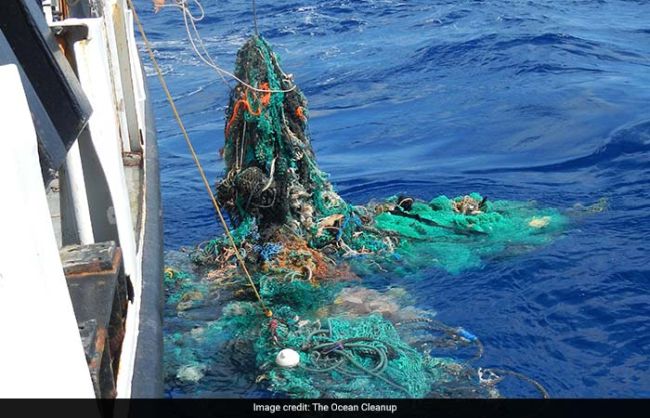Beijing: Robot fish that “eat” microplastics may one day help to clean up the world’s polluted oceans, says a team of Chinese scientists from Sichuan University in southwest China. Soft to touch and just 1.3 centimetres (0.5 inch) in size, these robots already suck up microplastics in shallow water. The team aims to enable them to collect microplastics in deeper water and provide information to analyse marine pollution in real time, said Wang Yuyan, one of the researchers who developed the robot.
We developed such a lightweight miniaturised robot. It can be used in many ways, for example in biomedical or hazardous operations, such a small robot that can be localised to a part of your body to help you eliminate some disease.
Also Read: Study Finds More Microbes Can Degrade Plastics At Heavy Plastic Pollution Places
The black robot fish is irradiated by a light, helping it to flap its fins and wiggle its body. Scientists can control the fish using the light to avoid it crashing into other fish or ships.
If it is accidentally eaten by other fish, it can be digested without harm as it is made from polyurethane, which is also biocompatible, Wang said.
The fish is able to absorb pollutants and recover itself even when it is damaged. It can swim up to 2.76 body lengths per second, faster than most artificial soft robots.
We are mostly working on collection (of microplastics). It is like a sampling robot and it can be used repeatedly, she said.
Also Read: COP26: What Is Climate Change Adaptation, And Why Is It Important For Human Survival?
(Except for the headline, this story has not been edited by NDTV staff and is published from a syndicated feed.)
NDTV – Dettol have been working towards a clean and healthy India since 2014 via the Banega Swachh India initiative, which is helmed by Campaign Ambassador Amitabh Bachchan. The campaign aims to highlight the inter-dependency of humans and the environment, and of humans on one another with the focus on One Health, One Planet, One Future – Leaving No One Behind. It stresses on the need to take care of, and consider, everyone’s health in India – especially vulnerable communities – the LGBTQ population, indigenous people, India’s different tribes, ethnic and linguistic minorities, people with disabilities, migrants, geographically remote populations, gender and sexual minorities. In wake of the current COVID-19 pandemic, the need for WASH (Water, Sanitation and Hygiene) is reaffirmed as handwashing is one of the ways to prevent Coronavirus infection and other diseases. The campaign will continue to raise awareness on the same along with focussing on the importance of nutrition and healthcare for women and children, fight malnutrition, mental wellbeing, self care, science and health, adolescent health & gender awareness. Along with the health of people, the campaign has realised the need to also take care of the health of the eco-system. Our environment is fragile due to human activity, which is not only over-exploiting available resources, but also generating immense pollution as a result of using and extracting those resources. The imbalance has also led to immense biodiversity loss that has caused one of the biggest threats to human survival – climate change. It has now been described as a “code red for humanity.” The campaign will continue to cover issues like air pollution, waste management, plastic ban, manual scavenging and sanitation workers and menstrual hygiene. Banega Swasth India will also be taking forward the dream of Swasth Bharat, the campaign feels that only a Swachh or clean India where toilets are used and open defecation free (ODF) status achieved as part of the Swachh Bharat Abhiyan launched by Prime Minister Narendra Modi in 2014, can eradicate diseases like diahorrea and the country can become a Swasth or healthy India.
[corona_data_new]

























